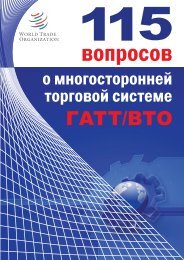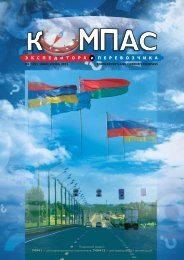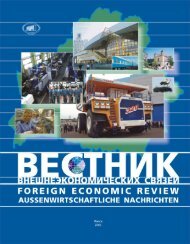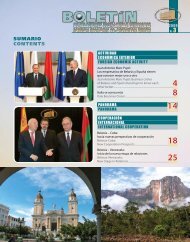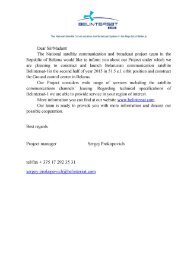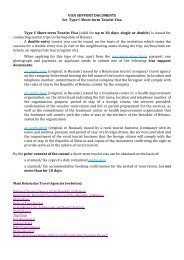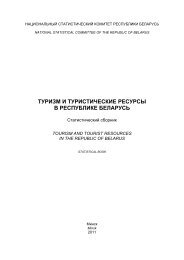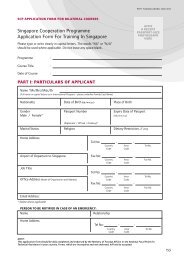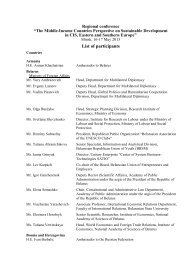• China. The Minimum Livelihood GuaranteeScheme is the Chinese government’s mainresponse to the new challenges of social protectionbrought about by increasing privatizationand engagement with the globalmarket. It guarantees a minimum income inurban areas by filling the gap between actualincome and a locally set poverty line. So, despiteincreasing income inequality in China,there is potential for redistributive policies toreduce poverty and enhance food security. Inaddition, extending equal rights to migrantsin cities can have a decisive impact on theirability to access comparable social services.• Brazil. Despite slower economic growth thanin China and India, Brazil has reduced inequalityby introducing a poverty reductionprogramme, extending education and raisingthe minimum wage. Its conditional cashtransfer programme Bolsa Escola, launchedin 2001, followed the conceptual foundationof others in Latin America, such as Mexico’sProgresa (now called Oportunidades;box 3.9). In 2003 Bolsa Escola was expandedto Bolsa Familia by folding several othercash and in-kind transfer programmes intoa unified targeting system under streamlinedadministration. By 2009, Bolsa Familiacovered more than 12 million householdsacross the country, or 97.3% of the targetpopulation. These programmes have alsobroken ground in terms of programme administrationand female empowerment bydeveloping innovative distribution channels,such as ATM cards for low-income motherswithout bank accounts. The result has beensubstantial declines in poverty and extremepoverty and reduced inequality. 106• Chile. In response to findings that state subsidieswere not reaching the extreme poor,Chile Solidario was launched in 2002 to reachthe extreme poor with a combination of aidand skill development. Focusing on householdassistance, it takes the view that extremepoverty is multidimensional, extending beyondlow income to include other deprivationsin basic capabilities such as health and education.Furthermore, poverty reduction requiresthe mitigation of vulnerability to commonevents, such as sickness, accidents and unemployment.Together with other social policies,the programme has increased the take-up ofBOX 3.9Conditional cash transfer programmes and Mexico’s OportunidadesConditional cash transfer programmes are designed to increase beneficiaries’incomes and their access to health and education by making transfers conditionalon requirements such as visits to health clinics and school attendance.They target certain beneficiaries (typically individuals from low-income ordisadvantaged households) and provide support in cash instead of as in-kindbenefits, with the transfers conditional on activities related to health andeducation. Moreover, the programmes can be designed to allow rigorous impactevaluation. For instance, the Tekopora programme in Paraguay has beenshown to have positive impacts on nutrition, health, education and povertyreduction without having negative impacts on labour supply.Mexico’s Oportunidades is a conditional cash transfer programme targetedto poor households conditional on children’s school attendance andmedical checkups and parents’ attendance at community meetings whereinformation is provided on personal health and hygiene. The programme isdesigned to break the intergenerational transmission of poverty. Originallycalled Progresa, it aims to alleviate current and future poverty by giving parentsfinancial incentives (cash) to invest in the health and education of theirchildren. The programme, which started in 1997, is one of the largest conditionalcash transfer programmes in the world, distributing about $3 billion tosome 5 million beneficiary households in 2012.Oportunidades transfers, given bimonthly to female heads of household,have two parts. The first, received by all beneficiary households,is a fixed food stipend, conditional on family members obtaining preventivemedical care, and is intended to help families spend on more andbetter nutrition. The second comes in the form of education scholarshipsand is conditional on children attending school a minimum of 85% of thetime and not repeating a grade more than twice. The education stipendprovided for each child under age 18 enrolled in school between thethird grade of primary school and the third (last) grade of junior highvaries by grade and gender. It rises substantially after graduation fromprimary school and is higher for girls than for boys during secondary andtertiary school. Beneficiary children also receive money for school suppliesonce a year.Conditional cash transfer programmes cost less than traditional inkindsocial assistance interventions. Brazil’s Bolsa Familia and Mexico’sOportunidades, the two largest programmes in Latin America, cost less than1% of GDP. In some cases they have been perceived as tools to provideaccess to universal basic rights such as health and education, but in othersthey have led to the exclusion of some localities due to the inadequate supplyof services.Source: Hailu and Veras Soares 2008; Ribas, Veras Soares and Hirata 2008.84 | HUMAN DEVELOPMENT REPORT <strong>2013</strong>
health and education services during boomtimes, while playing a countercyclical role ineconomic downturns by providing a muchneeded safety net to the poor.The rising South is thus developing a broadersocial and poverty reduction agenda in whichpolicies to address inequalities, institutionalfailures, social barriers and personal vulnerabilitiesare as central as promoting economicgrowth. This follows from an increased understandingthat social challenges extend beyondincome poverty; they also include lack of accessto education, poor health, social inequality andlimited social integration (box 3.10).* * *An agenda for development transformationthat promotes human development is multifaceted.It expands people’s assets by universalizingaccess to basic social services; extendingcredit to the population, especially the poor;protecting common resources; and introducingland reform where relevant. It improves thefunctioning of state and social institutions topromote equitable growth where the benefitsare widespread. It prioritizes rapid growth inemployment and works to ensure that jobs areof high quality. It reduces bureaucratic and socialconstraints on economic action and socialmobility. It holds leadership accountable. It involvescommunities in setting budget prioritiesand disseminating information. And it focuseson social priorities.Many countries of the South have demonstratedwhat can be achieved through a developmentalstate. But even in higher achievingcountries, continuing success is not guaranteed.Countries across the world are facing a series ofchallenges, from rising inequality to spreadingenvironmental degradation. The next chapteraddresses these threats and considers what isneeded to sustain future progress in humandevelopment.A broader social andpoverty reductionagenda is neededin which policies toaddress inequalities,institutional failures, socialbarriers and personalvulnerabilities are ascentral as promotingeconomic growthBOX 3.10Michael Bloomberg, Mayor, New York CityWhy New York City looked South for antipoverty policy adviceIn New York City, we are working to better the lives of our residents in manyways. We continue to improve the quality of education in our schools. Wehave improved New Yorkers’ health by reducing smoking and obesity. Andwe have enhanced the city’s landscape by adding bike lanes and plantinghundreds of thousands of trees.We have also sought to reduce poverty by finding new and better waysto build self-sufficiency and prepare our young people for bright futures. Tolead this effort, we established the Center for Economic Opportunity. Itsmission is to identify strategies to help break the cycle of poverty throughinnovative education, health and employment initiatives.Over the last six years, the centre has launched more than 50 pilotprogrammes in partnership with city agencies and hundreds of communitybasedorganizations. It has developed a customized evaluation strategy foreach of these pilots, monitoring their performance, comparing outcomes anddetermining which strategies are most successful at reducing poverty andexpanding opportunity. Successful programmes are sustained with new publicand private funds. Unsuccessful programmes are discontinued, and resourcesreinvested in new strategies. The centre’s findings are then sharedacross government agencies, with policymakers, with nonprofit partners andprivate donors and with colleagues across the country and around the worldwho are also seeking new ways to break the cycle of poverty.New York is fortunate to have some of the world’s brightest minds workingin our businesses and universities, but we recognize there is much tolearn from programmes developed elsewhere. That is why the centre beganits work by conducting a national and international survey of promising antipovertystrategies.In 2007, the centre launched Opportunity NYC: Family Rewards, the firstconditional cash transfer programme in the United States. Based on similarprogrammes operating in more than 20 other countries, Family Rewards reducespoverty by providing households with incentives for preventive healthcare, education and job training. In designing Family Rewards, we drew onlessons from Brazil, Mexico and dozens of other countries. By the end ofour three-year pilot, we had learned which programme elements worked inNew York City and which did not; information that is now helpful to a newgeneration of programmes worldwide.Before we launched Opportunity NYC: Family Rewards, I visitedToluca, Mexico, for a firsthand look at Mexico’s successful federal conditionalcash transfer programme, Oportunidades. We also participatedin a North–South learning exchange hosted by the United Nations.We worked with the Rockefeller Foundation, the World Bank, theOrganization of American States and other institutions and internationalpolicymakers to exchange experiences on conditional cash transfer programmesin Latin America, as well as in Indonesia, South Africa andTurkey.Our international learning exchanges are not limited to these cashtransfer initiatives; they also include innovative approaches to urban transportation,new education initiatives and other programmes.No one has a monopoly on good ideas, which is why New York willcontinue to learn from the best practices of other cities and countries. Andas we adapt and evaluate new programmes in our own city, we remain committedto returning the favour and making a lasting difference in communitiesaround the world.Chapter 3 Drivers of development transformation | 85
- Page 1 and 2:
WNSEHuman DevelopmentReport 2013The
- Page 3 and 4:
Human Development Report 2013The Ri
- Page 5 and 6:
Human Development Report 2013 TeamD
- Page 7 and 8:
Finally, the Report also calls for
- Page 9 and 10:
Heather Simpson, Ben Slay, Mounir T
- Page 11 and 12:
3.6 India’s Supreme Court issues
- Page 13 and 14:
OverviewOne of the most heartening
- Page 15 and 16:
and sustainability are fully incorp
- Page 17 and 18:
Without investment in people, retur
- Page 19 and 20:
opportunity to reap the full benefi
- Page 21 and 22:
Woods institutions, the United Nati
- Page 23 and 24:
IntroductionWhen developed economie
- Page 25 and 26:
leading economies—Brazil, China a
- Page 27 and 28:
comparable access to information, e
- Page 29 and 30:
mobile phones: cellular banking is
- Page 32 and 33:
“The political problem ofmankind
- Page 34 and 35:
BOX 1.1Fairness, macroeconomics and
- Page 36 and 37:
BOX 1.3Amartya Sen, Nobel Laureate
- Page 38 and 39:
FIGURE 1.1Income per capita is risi
- Page 40 and 41:
BOX 1.4Subjective indicators of wel
- Page 42 and 43:
FIGURE 1.4There is notable variatio
- Page 44 and 45:
FIGURE 1.6Most regions show declini
- Page 46 and 47: Progress in humandevelopment achiev
- Page 48 and 49: BOX 1.7Social competencies: human d
- Page 50 and 51: TABLE 1.3Inequality and satisfactio
- Page 52 and 53: Not all countries havethe precondit
- Page 54 and 55: “When the music changes,so does t
- Page 56 and 57: BOX 2.1The South’s integration wi
- Page 58 and 59: FIGURE 2.1As a share of world merch
- Page 60 and 61: BOX 2.2Acquisitions by the South of
- Page 62 and 63: FIGURE 2.3Between 2000 and 2010, In
- Page 64 and 65: FIGURE 2.4Export earnings per capit
- Page 66 and 67: BOX 2.6Final assembly is about more
- Page 68 and 69: Instead of having a centreof indust
- Page 70 and 71: FIGURE 2.6Emerging market economies
- Page 72 and 73: Developing countriestrade more amon
- Page 74 and 75: “We cannot expect thatall nations
- Page 76 and 77: TABLE 3.1Selected developing countr
- Page 78 and 79: A common featureof countries thatha
- Page 80 and 81: More important thangetting prices r
- Page 82 and 83: BOX 3.5Eastern Europe and Central A
- Page 84 and 85: States have to beconscious that the
- Page 86 and 87: As countries develop,they tend to d
- Page 88 and 89: Having weathered theAsian financial
- Page 90 and 91: Providing publicservices that contr
- Page 92 and 93: Advancing health requiresmore than
- Page 94 and 95: Universal public healthand educatio
- Page 98 and 99: “Each generation will reap whatth
- Page 100 and 101: concerns will make for a complex en
- Page 102 and 103: A greater emphasison education cans
- Page 104 and 105: FIGURE 4.1Under the fast track scen
- Page 106 and 107: Around the worldpeople are calling
- Page 108 and 109: FIGURE 4.4Different environmental s
- Page 110 and 111: FIGURE 4.5Education policies can al
- Page 112 and 113: BOX 4.2China and Ghana: who benefit
- Page 114 and 115: FIGURE 4.8countries thus converge t
- Page 116 and 117: “Let us join hands to try tocreat
- Page 118 and 119: Areas of globalinternational concer
- Page 120 and 121: Addressing climatechange requires t
- Page 122 and 123: International governanceis increasi
- Page 124 and 125: BOX 5.2Jo Leinen, Member of the Eur
- Page 126 and 127: facilitates reserve investments and
- Page 128 and 129: Responsible sovereigntytakes the lo
- Page 130 and 131: FIGURE 5.1Under the accelerated pro
- Page 132 and 133: Good policymakingrequires greater f
- Page 134 and 135: A fair and less unequalworld requir
- Page 137 and 138: NotesOverview1 Atsmon and others 20
- Page 139 and 140: 25 Blinder 2006.26 UNIDO 2009.27 UN
- Page 141 and 142: which is 61.7 deaths per 1,000 live
- Page 143 and 144: ReferencesAbdurazakov, A., A. Minsa
- Page 145 and 146: urban_world_cities_and_the_rise_of_
- Page 147 and 148:
Kamau, P., D. McCormick, and N. Pin
- Page 149 and 150:
Labor Administration. Geneva: Inter
- Page 151 and 152:
Human Development Report 2013The Ri
- Page 153 and 154:
Statistical acknowledgementsThe Rep
- Page 155 and 156:
Key to HDI countries and ranks, 201
- Page 157 and 158:
Human Development Report 2013The Ri
- Page 159 and 160:
Human Development Report 2013The Ri
- Page 161 and 162:
Human Development Report 2013The Ri
- Page 163 and 164:
Human Development Report 2013The Ri
- Page 165 and 166:
Human Development Report 2013The Ri
- Page 167 and 168:
Human Development Report 2013The Ri
- Page 169 and 170:
Human Development Report 2013The Ri
- Page 171 and 172:
Human Development Report 2013The Ri
- Page 173 and 174:
Human Development Report 2013The Ri
- Page 175 and 176:
Human Development Report 2013The Ri
- Page 177 and 178:
Human Development Report 2013The Ri
- Page 179 and 180:
Human Development Report 2013The Ri
- Page 181 and 182:
Human Development Report 2013The Ri
- Page 183 and 184:
Human Development Report 2013The Ri
- Page 185 and 186:
Human Development Report 2013The Ri
- Page 187 and 188:
Human Development Report 2013The Ri
- Page 189 and 190:
Human Development Report 2013The Ri
- Page 191 and 192:
Human Development Report 2013The Ri
- Page 193 and 194:
Human Development Report 2013The Ri
- Page 195 and 196:
Human Development Report 2013The Ri
- Page 197 and 198:
Human Development Report 2013The Ri
- Page 199 and 200:
Human Development Report 2013The Ri
- Page 201 and 202:
Human Development Report 2013The Ri
- Page 203 and 204:
Human Development Report 2013The Ri
- Page 205 and 206:
Human Development Report 2013The Ri
- Page 207 and 208:
Human Development Report 2013The Ri
- Page 209 and 210:
Human Development Report 2013The Ri
- Page 211 and 212:
Statistical referencesADB (Asian De
- Page 213 and 214:
Core features of the model pertinen
- Page 215 and 216:
Countries and HDI ranks in 2012 and




